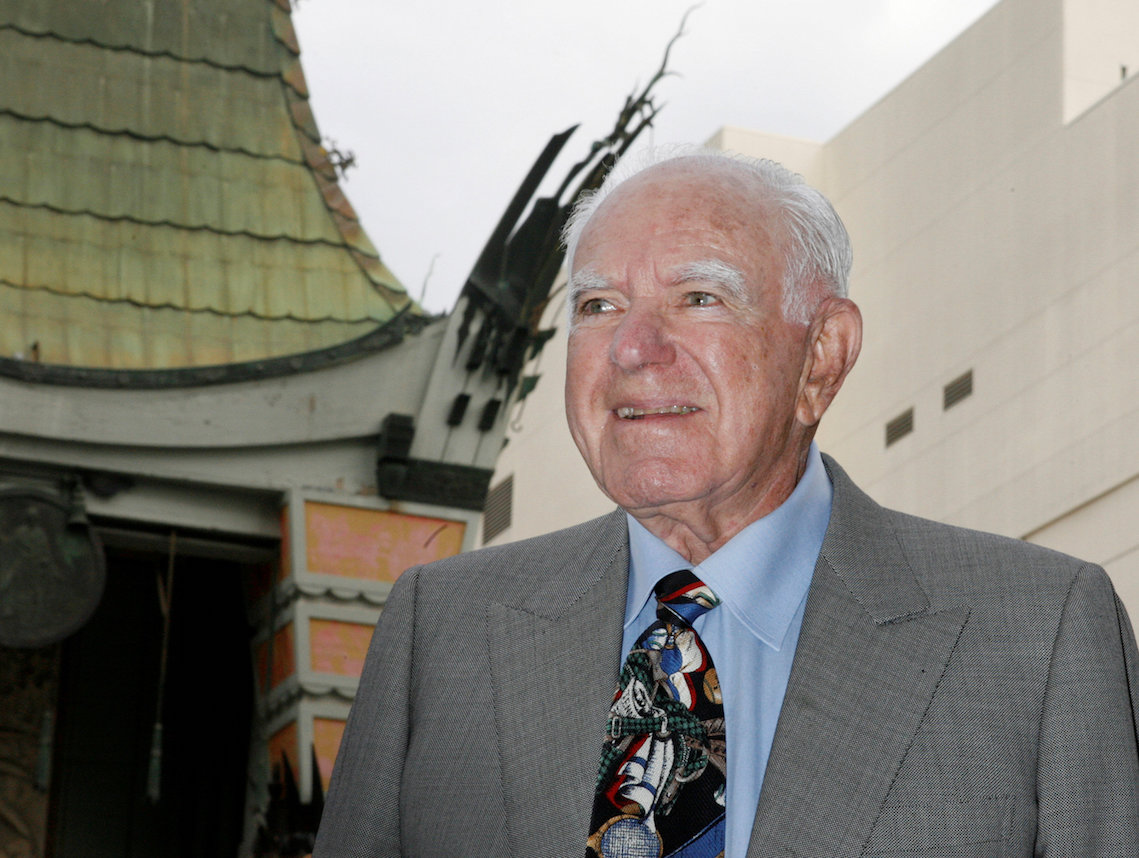 Judge Joseph A. Wapner, former host of the television series “The People’s Court” poses with Graumans Chinese theater in background before ceremonies unveiling his star on the Hollywood Walk of Fame. Nov. 12, 2009. Photo by Fred Prouser/REUTERS.
Judge Joseph A. Wapner, former host of the television series “The People’s Court” poses with Graumans Chinese theater in background before ceremonies unveiling his star on the Hollywood Walk of Fame. Nov. 12, 2009. Photo by Fred Prouser/REUTERS. Joseph Albert Wapner, star of “The People’s Court” and the man who many would judge to be television’s first reality star, died Feb. 26 at his home in Los Angeles. He was 97.
His son David told The Associated Press that the retired Los Angeles judge died in his sleep after being hospitalized a week earlier with breathing problems and that he had been under hospice care at home.
Wapner was born in Los Angeles in 1919 into an Orthodox family, the son of immigrants from Eastern Europe; graduated from Hollywood High School (where he dated future movie star Lana Turner) in 1937; and earned a bachelor’s degree in philosophy from USC in 1941.
During World War II, he served in the Army in the Pacific theater and was wounded by sniper fire in the Philippines. He later received a Purple Heart and Bronze Star.
In 1948, he earned a law degree from USC and during a break in his studies, met petite Mickey Nebenzahl, a Texas native, on a blind date. Abandoning his usual sober deliberations, Wapner became engaged and married Mickey within two months of their first meeting.
Professionally, he went on to private practice until being appointed by California Gov. Edmund G. Brown as an L.A. municipal court judge in 1959. In 1961, he was selected to preside over the Superior Court system. He served for 18 years and retired in 1979.
Among the Jewish causes closest to the hearts of Joe and Mickey Wapner was the Brandeis-Bardin Institute (BBI) in Simi Valley. The couple was among the institute’s founding members and made a large donation to renovate and expand its library.
In 1992, Wapner was elected as BBI’s president and in 2007 initiated its merger with the University of Judaism (now American Jewish University). His involvement with BBI could be found in his childhood roots, or, as he put it, “Since I was a little kid, Judaism has meant a great deal to me and I am very proud to be a Jew.”
Colleagues who knew Wapner as judge and fellow officers at BBI used almost identical words to describe the character of the man: judicious, steady, fair, penetrating, principled, humane. Also, when the occasion warranted it, tough, demanding, a mite testy in the face of bootless arguments and, at times, intimidating. These characteristics carried over into his tennis game, in which he was a ranked senior player.
One of his most famous cases took place during his final year on the bench, when he presided over the divorce trial of Jack Kent Cooke, former owner of the Los Angeles Lakers, Los Angeles Kings and other sports franchises, and Cooke’s first wife, Jeannie Carnegie. The $49 million settlement set a world record.
Wapner didn’t settle into a leisurely retirement. In 1981, according to The New York Times, television producer Ralph Edwards (of “This Is Your Life” and “Truth or Consequences” fame) approached him to wield the gavel on a new show inspired by “Divorce Court” but involving real-life litigants and actual cases. This he did until 1993, handing down small claims rulings on 2,484 cases involving issues as varied as female oil wrestlers who didn’t follow the rules to siding with a defendant who refused to pay a reward offered for return of her dog when the missing pet’s remains were delivered.
“Everything on the show is real,” Wapner said in an interview with The Associated Press in 1986. “There’s no script, no rehearsal, no retakes. Everything from beginning to end is like a real courtroom, and I personally consider each case as a trial.”
He was memorialized in the 1988 film “Rain Man” by Dustin Hoffman’s character counting down the “minutes to Wapner” to ensure that Tom Cruise’s character would get him to a TV in time to watch the show. He wrote a popular memoir filled with anecdotes, titled “A View From the Bench,” that was published in 1987. And in 2009, Wapner even got a star on the Hollywood Walk of Fame.
The true measure of his popularity was probably best captured in a 1989 poll by The Washington Post that found two-thirds of people surveyed could not name any of the nine justices on the U.S. Supreme Court, but 54 percent knew that Wapner was the man in charge on “The People’s Court.”
In addition to his son David, Wapner is survived by his wife of 70 years, Mickey; another son, Frederick, a judge on the L.A. Superior Court; two daughters-in-law; four grandchildren and a great-granddaughter. A daughter, Sarah, died in 2005.






















 More news and opinions than at a Shabbat dinner, right in your inbox.
More news and opinions than at a Shabbat dinner, right in your inbox.